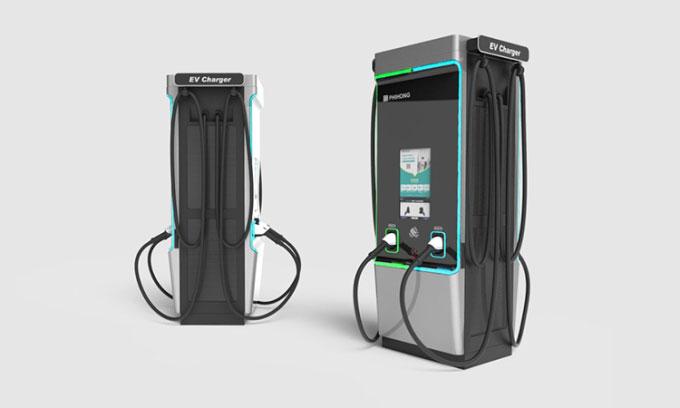Zerova Technologies, a Taiwanese company, has unveiled a super-fast 4-gun charger for electric vehicles at the eMove360° exhibition taking place in Berlin this week.
The new charger, named Four Gun – expected to hit the market in Q4 2023 – features a design with 4 charging ports, allowing simultaneous charging of 4 electric cars. With a maximum output of 480 kW, it can fully charge a vehicle in just 10 minutes and provide enough power for a 150 km journey in only 5 minutes, as reported by Interesting Engineering on October 11.
The compact design allows the charger to be installed in various locations, particularly in tight urban spaces. The four 5-meter charging cables also enhance accessibility for vehicles. Four Gun will support four main charging standards: CCS-1, CCS-2, CHAdeMO, and GB.

Simulation of Zerova Technologies’ Four Gun charger. (Photo: EHVT)
Zerova Technologies plans to launch two versions of their ultra-fast charger, including a standard version with a power output of 360 kW and an extended version with 480 kW. Both will be equipped with large advertising screens, allowing the company to promote its brand and benefit from user interaction.
Originally established as part of the renowned energy supplier Phihong, Zerova Technologies became an independent company on September 1, 2022, and now focuses solely on electric vehicle charging technology.
As the electric vehicle market rapidly expands, many companies and organizations around the world are racing to research fast and flexible charging technologies.
The multinational automotive group Stellantis has developed and tested Dynamic Wireless Power Transfer (DWPT) technology, enabling electric vehicles to charge while moving on specially equipped dedicated lanes.
Meanwhile, researchers from the Idaho National Laboratory in the U.S. are using artificial intelligence and other advanced analytics to reduce electric vehicle charging times without damaging the battery.
Additionally, NASA is testing a temperature control technology – originally developed for space missions – aimed at significantly shortening electric vehicle charging times. This technology focuses on improving heat transfer from the charging cables and greatly increasing the amount of electricity that today’s chargers supply to electric vehicles. According to NASA, this could allow batteries to charge from 0% to 100% in just 5 minutes or less.


















































